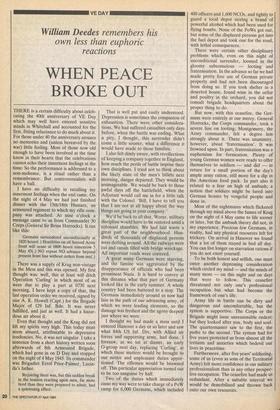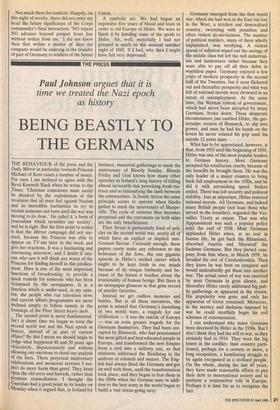VE DAY William Deedes remembers his
own less than euphoric reactions
WHEN PEACE BROKE OUT
THERE is a certain difficulty about celeb- rating the 40th anniversary of VE Day which may well have entered sensitive minds in Whitehall and accounted for the first, fitting reluctance to do much about it. For those under 40 the anniversary arouses no memories and (unless bereaved by the war) little feeling. Most of those now old enough to have been involved at the time know in their hearts that the celebrations cannot echo their innermost feelings at the time. So the performance is addressed to a non-audience, is a ritual rather than a remembrance. But controversialists will have a ball.
I have no difficulty in recalling my innermost feelings when the end came. On the night of 4 May we had just finished dinner with the 13th/18th Hussars, an armoured regiment to which my rifle com- pany was attached. At nine o'clock a message came to us from Commander 30 Corps (General Sir Brian Horrocks). It ran like this:
Germans surrendered unconditionally at 1820 hours(.) Hostilities on all Second Army front will cease at 0800 hours tomorrow 5 May 45(.) NO repeat NO advance beyond , present front line without orders from me(.)
There was a supply of Krug non-vintage in the Mess and this was opened. My first thought was: well, this at least will ditch Operation 'Curling' in which most of us were due to play a part at 0730 next morning. I have kept a‘ copy of that, the last operation order we received, signed by one A. K. Howell (Capt.) for the Brigade Major of 129 Inf. Bde. It was never fulfilled, and just as well. It had a hazar- dous air about it.
Even that thought and the Krug did not lift my spirits very high. This today must seem absurd, attributable to depressive tendencies. No, it was not singular. I take a sentence from a short history written soon afterwards of 8th Armoured Brigade, which had gone in on D Day and stopped on the night of 4 May 1945. Its commander was Brigadier Errol Prior-Palmer, Lucin- da's father.
Rejoicing there was, but this sudden break in the tension reacting upon men, far more tired than they were prepared to admit, had a quietening effect.
That is well put and easily understood. Depression is sometimes the companion of exhaustion. There were other considera- tions. We had suffered casualties only days before, when the battle was ending. What a pity, I thought, this surrender didn't come a little sooner; what a difference it would have made to those families.
I also felt dimly aware, with recollections f keeping a company together in England, ow much the perils of battle impose their own disciplines. I tried not to think about khe likely state of the men's billets next morning, danger departed. They would be !unimaginable. We would be back to those lawful days off the battlefield, when the Adjutant would call me in for a little talk With the Colonel. 'Bill, I have to tell you that I am not at all happy about the way things are going in your company.'
We'd be back to all that. Worse, military discipline would have to be restored amid a colosssal shambles. We had laid waste a great part of the neighbourhood. Hun- dreds of thousands of displaced persons were drifting around. All the railways were cut and canals filled with bridge wreckage. All important roads were cratered.
A great many Germans were starving, and the famine was aggravated by the disappearance of officials who had been prominent Nazis. It is hard to convey at this distance what that part of Germany looked like in the early summer. A whole country had been battered to a stop. The Germans immediately around us now had lain in the path of our advancing army, of which we were leading elements, so the damage was freshest and the agony deepest just where we were.
I thought we had made a mess until I entered Hanover a day or so later and saw what 84th US Inf. Div, with Allied air forces and supporting arms, had done. I foresaw, as we sat at dinner, an early 0-group next day, replacing 'Curling', at which these matters would be brought to our notice and unpleasant duties appor- tioned. The riflemen would be browned off. This particular appreciation turned out to be too sanguine by half.
Two of the duties which immediately came my way were to take charge of a PoW camp for 6,000 Germans, which included 400 officers and 1,600 NCOs, and tightly to guard a local depot storing a brand of powerful alcohol which had been used for flying bombs. None of the PoWs got out, but some of the displaced persons got into the fuel depot and took one for the road, with lethal consequences.
There were certain other disciplinary problems which, even on this night of unconditional surrender, loomed in the gloomy subconscious — looting and fraternisation. In the advance so far we had made pretty free use of German private property and had not been discouraged from doing so. If you took shelter in a deserted house, found wine in the cellar and poultry in the orchard, you did not consult brigade headquarters about the proper thing to do.
But now, with this ceasefire, the Ger- mans were entirely at our mercy. General Horrocks, the Corps commander, took a severe line on looting; Montgomery, the Army commander, felt a degree less strongly about it. There was unanimity, however, about 'fraternisation'. It was frowned upon. In part, fraternisation was a euphemism for fornication. Plenty of young German women were ready to offer themselves to soldiers — and did — in return for a small portion of the day's ample army ration, still more for a dip in the American food pack. In part also it related to a fear on high of ambush; a notion that soldiers might be lured into German houses by vengeful people and done in.
Most of the nightmares which flickered through my mind above the fumes of Krug on the night of 4 May came to life sooner or later, but the ambush theory did not, in my experience. Precious few Germans, in reality, had any physical resources left for trickery. On arrival in Hanover we found that a lot of them stayed in bed all day. You can live longer on starvation rations if you do not exert yourself.
To be both honest and selfish, one must enter another depressing consideration which circled my mind — and the minds of many more — on this night and on days that were to follow. This ceasefire threatened not only one's professional occupation but what had become the framework of one's life.
Army life in battle can be dirty and dangerous and uncomfortable, but the system is supportive. The Corps or the Brigade might issue unreasonable orders; but they looked after you, body and soul.
The quartermaster saw to the first, the padre to the second. The system had for five years protected us from almost all the irritants and anxieties which bedevil our lives in peacetime.
Furthermore, after five years' soldiering, some of us (even as sons of the Territorial Army) felt more confidence in our military professionalism than in any other prospec- tive occupation. The ceasefire had made us redundant. After a suitable interval we would be demobilised and thrown back onto our own resources. Not much there for comfort. Happily, on this night of revelry, there did not enter my head the future significance of the Corps commander's final instruction: 'NO repeat NO advance beyond present front line without orders from me.' I did not know then that within a matter of days my company would be assisting in the transfer of part of Germany to soldiers of the Soviet Union.
A symbolic act. We had begun an expensive five years of blood and tears in order to rid Europe of Hitler. We were to finish it by handing some of the spoils to Stalin. Ah, well, mercifully I had not grasped as much on this unusual summer night of 1945. If I had, why then I might have felt very depressed.



















































 Previous page
Previous page